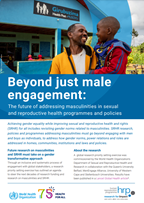24 May 2024
Health Policy Watch News
Independent scientists and members of UN advisory groups for SRH
5 September 2023 - 23 September 2024
It has been 30 years since the International Conference on Population and Development in Cairo established the contemporary rights-based approach to sexual and reproductive health that guides us today. Ten years later, in 2004, the first strategy on reproductive health, the Reproductive health strategy to accelerate progress towards the attainment of international development goals and targets, was adopted at the 57th World Health Assembly.
Providing the foundation for our work in HRP, comprehensive sexual and reproductive health services encompass a wide range of health needs beyond just reproduction. These services cover access to contraception, fertility and infertility care, maternal and perinatal health, prevention and treatment of sexually transmitted infections (STIs), protection from sexual and gender-based violence, and education on safe and healthy relationships. By addressing these various aspects of health, primary health care systems demonstrate a commitment to holistic care that considers the physical, mental and social well-being of individuals.
Ensuring access to comprehensive sexual and reproductive health services upholds the dignity, rights and well-being of people worldwide.
Throughout this landmark year, the World Health Organization (WHO) and the UN Special Programme on Human Reproduction (HRP) will be celebrating hard-won gains based on evidence that brought a focus to the interests and needs of individuals and health systems. We will continue to expand global understanding of comprehensive reproductive health and rights and sexual health.
This is the moment to take a forward-looking assessment of where we are, and where we need to go in order to achieve global goals and commitments.
Watch this space for updated activities.

Adopted by the 57th World Health Assembly in 2004, this strategy is intended for a broad audience of policy-makers within governments, international agencies,...
Narasimhan M, Say L, Allotey P. Three decades of progress and setbacks since the first international conference on population and development. Bull World Health Organ. 2024 Apr 1;102(4):226-226A. doi: 10.2471/BLT.24.291654. PMID: 38562203; PMCID: PMC10976866.
24 May 2024
Health Policy Watch News
Independent scientists and members of UN advisory groups for SRH


Achieving gender equality while improving sexual and reproductive health and rights (SRHR) for all includes revisiting gender norms related to masculinities....

Sexual and reproductive health are integral elements of the right of everyone, to the enjoyment of the highest attainable standard of physical and mental health....

Infertility is a disease of the male or female reproductive system defined by the failure to achieve a pregnancy after 12 months or more of regular unprotected...

A global shortage of an estimated 10 million health workers is anticipated by 2030, a record 130 million people are in need of humanitarian assistance,...

The WHO Labour Care Guide is a tool that aims to support good-quality, evidence-based, respectful care during labour and childbirth, irrespective of the...

This book, Family Planning: A Global Handbook for Providers, offers technical information to help health care providers deliver family planning methods...
Developed by SRHR (including HRP).
Find the right WHO and HRP tools to help you in your work to advance health, rights and gender equality for all.
